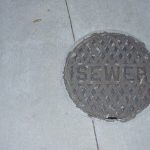A leaking faucet, given enough to time, could create a great deal of damage to a wide variety of surfaces and materials in your home. In fact, it could over an extended period of time even cause damage to concrete foundation slabs. This may even create a sinkhole that could destabilize the foundations of your home, and this would be extremely expensive to fix. In this article, we will take a closer look at this issue, show you the danger signs and offer some advice on how to deal with the problem.
The Nature of Concrete
When most people think about concrete as a material, they imagine it to be extremely tough and durable. This is a perfectly reasonable assumption as we see concrete poured in a wide variety of construction projects, such as bridges, skyscrapers, and dams, that rely on strength to work. Actually, concrete is nowhere near as solid as many people would think, it is permeated by thousands of tiny pores, and these can allow other substances to enter. This substance is often water or other liquids that can find their way into these pores and then break apart the concrete from the inside. Every concrete surface has these pores, but poorly mixed concrete that’s badly installed will be far more susceptible to this kind of damage. This situation is even worse if the concrete is located in a coastal location because salt water is far more corrosive to concrete than regular water.
Working with Concrete
Many people are now taking up DIY to carry out repairs and home improvement projects in their spare time. This can be a fun activity, and you can save some money on hiring professionals in some cases. But, there are some tasks that are better left to the experts and two of these would be plumbing and pouring concrete. Of course, we’re not talking about changing a washer in a leaky faucet or building a BBQ pit and countertop in the yard. When essential features in your home, such as the integrity of the foundations and a leaky failing plumbing system are threatening to cause a massive amount of damage, it’s time to call in the experts.
What are the Danger Signs?
In some cases, the dangers signs could be very obvious, perhaps there is a leaking faucet that’s easy to locate, and you can see that it’s dripping water onto concrete. Sadly, this isn’t usually the case, and the leak could be located behind a wall, in an attic space or under the floor. So, it’s important to keep an eye out for some other clues that you may have a problem that needs a professional plumber.
When concrete is becoming compromised, you may notice small cracks and fissures appearing on the surface. This is often noticed first outside on concrete patios and along paths, but it could also appear on a concrete basement or garage floor too. Another thing to look out for are water stains that could be running down from a basement ceiling, and this would indicate a water leak somewhere above. Over time these smaller water stains and imperfections in concrete surfaces will grow more substantial, and the water leak needs to be located and fixed. Any cracks that you can see are just on the surface, and if you delve deeper, there will be far more damage hidden underneath.
Locating and fixing a water leak of this nature would be a hard task for most people with some basic DIY knowledge. As we mentioned earlier the water leak could be located in an out of the way location making it hard to identify. The site of the needed repair could be difficult to reach, and a professional plumber will have the knowledge and skills to get it done.
The Importance of Early Repairs
When concrete is degraded by a water leak, it can be an extremely slow process, and you may not notice it for a long time. By the time that you do notice it, it’s likely that a great deal of damage has already occurred that you cannot see. For this reason, it’s very important that you take this seriously and get the necessary repair carried out as soon as possible. The concrete could already be reaching the point where it could break apart entirely, and it will need to be fixed. The water leak that caused the problem will need to be located and fixed first to allow work on the concrete to commence. If you spot any of the warning signs that we showed earlier, it’s time to call in a professional certified plumber for expert advice.
What Repair Options are Available?
It may be tempting to carry out a simple patch job on the water damaged concrete, but this would be a mistake. This is more like covering up the deeper problems that you cannot see further into the concrete. Sooner or later those cracks will return because the underlying cause and the deeper damage has not been fixed.
If the damage is less extensive, it may be possible to remove and replace certain sections of the concrete structure. This can happen if the water damage is located quickly and fixed before it can spread too far. Again, it’s worth mentioning that this is not a job for an amateur and it’s essential to remove all the damaged concrete first.
In more extreme cases, it may be necessary to remove all of the concrete and replace it with a fresh pour. This needs to be professionally done, remember that a poor concrete installation is far more likely to allow water to penetrate. It’s not likely that a sinkhole will develop any time soon, but the foundations of your home could be affected, and that is a major problem that needs to be addressed.
Prevention is always better than the cure, so call your
local certified plumber and get a health check for your plumbing system. Any potential problems can be identified earlier, and this will make them easier and cheaper to fix.
By Giovanni Longo President Flood Brothers Plumbing
Giovanni Longo is a 3rd generation master plumber who has been practicing his craft and trade in the greater Los Angeles area for well over a decade and a half. A plumbing and hydraulics-engineering innovator, Giovanni’s particular world-class expertise focuses on dealing with challenging sewer system designs as well as resolving complex commercial and residential draining issues. As a certified Flood Mitigation expert, he is also well versed in a wide variety of water damage and remediation solution.





